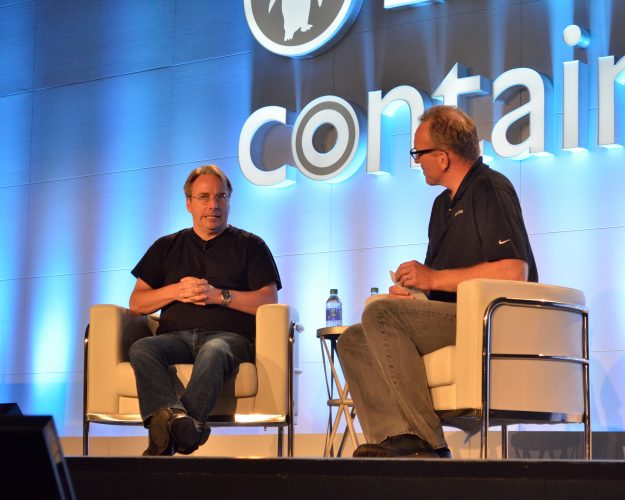Although the Linux Foundation seems to represent Linux and the entire Linux user community, many community members have complained for years that the organization has defaulted to representing only the interests of its corporate membership.

I first heard of the Linux Foundation when SourceForge (now Geeknet) sold it the Linux.com URL. Overnight, the Linux.com news site run by Robin “roblimo” Miller and Lee Schlesinger was shut down, and I was looking for a job. I quickly found new places to write, but ever since I have viewed the Linux Foundation with mixed feelings. What has changed is that my reaction has grown less personal and more political as I watch how it operates.
On the one hand, the Linux Foundation represents the corporate arm of the free software alliance very well, with actions and statements that its members can easily comprehend. The corporate arm isn’t the one with which I identify, but it has a right to representation. Moreover, just as George Orwell pointed out that a rich man can not put in street lights solely for his own benefit,so the Linux Foundation cannot employ Linus Torvalds nor fund key projects without helping everyone with a stake in free software.
This help often goes unnoticed, because the Linux Foundation is frankly inept at self-promotion. For instance, how many free software supporters realize that Automotive Grade Linux is a major element in the development of the autonomous car? Similarly, who has heard of the CHIPS Alliance, whose mandate is to promote open hardware through development of the RISC-V chip and other parts of the tool chain? Over four dozen similar initiatives are sponsored by the Linux Foundation, and almost all are unknown.
More immediately, the Linux Foundation also assists with open source compliance, and gives travel funds to prominent developers and scholarships to beginning ones. Because of these activities, I have sometimes written in support of the foundation, and might do so again.
On the other hand, the Linux Foundation also has a history of ignoring the community. Its authority to speak for all free software — which many outsiders assume it has — was entirely self-granted. Not that free software users in academia or community development are united enough that any single group had the authority to grand the foundation a right to speak for the entire community, of course. However, the self-appointment plays all too well into many advocates’ fears of corporate arrogance.
In the same way, the foundation has accepted Microsoft all too readily for the ease of much of the community. Many community members still remember Microsoft’s continual campaign against free software, which it described at various times as cancer and as communism. Yet the Linux Foundation has not only accepted Microsoft as a Platinium member, but awarded it two seats on the board of directors: one representing Microsoft directly, and the other representing the Microsoft-owned GitHub.
However, that should hardly be surprising, since the board of directors also includes a member from Huawei, a firm that is so closely connected to the government of China that several countries, including Australia, Canada, New Zealand, the United Kingdom and the United States are reluctant to employ it to create their G5 infrastructure. Apparently, foundation members are not vetted for ethics, and only need to apply to be accepted. Arguably, enlisting Microsoft could be seen as a coup, but, in the highly moralistic free software world, such behavior finds at best acceptance.
In addition, the majority of the foundation’s current board represents large corporations, including Comcast, Fujitsu, Hitatchi, IBM, Oracle, and Panasonic. In contrast, in 2016 the foundation eliminated voting rights for individual members, and has filled at-large positions with more representatives of corporations. Matthew Garrett, a long-time FOSS advocate who has worked on many Linux projects, asserts that this structure was implemented to keep community members like Karen Sandler of the Software Freedom Conservancy off the board because of her advocacy of copyleft licenses like the GNU General Public License, which may or may not be true. However, what is true is that the Linux Foundation has no community representation in its governance whatsoever — nor academics nor makers, either. By accident or design, the foundation cannot claim in 2020 to represent all free software stakeholders, only a select special interest group.
This situation might not matter so much if organizations representing the community were strong enough to act as a counter-balance. The trouble is, they are not. In the last decade, the Free Software Foundation has backed away from its former activist tradition, while the Software Freedom Conservancy is almost unknown outside a small circle. Even Debian, while the dominant force among Linux distributions, makes fewer position announcements than it once did. As a result, the Linux Foundation has become the accepted public face of free software without any attempt to represent any except corporate interests.
The kindest interpretation of this situation is that the Linux Foundation has a public relations problem that it is unaware of and is overdue to correct. A more cynical interpretation is that, from its very start, the Linux Foundation has been a slow coup, gradually usurping an authority to which it has no right. Ask me on alternate days which one I believe.
Whatever the case, the solutions are the same. A concerted effort to get community members elected to at-large positions might help, although they would still be a minority. Many, too, might not want to legitimize the foundation by participating in it. A more promising response might be to see that community organizations are strengthened to provide a counter-balance, but that would be a slow solution if it worked at all.
I don’t pretend to have an answer. But I believe that free software owes its success to the fact that it is diverse. Centralizing the authority in the community means an end to free software as we know it — and that is something to be avoided at all cost. The very real good that the Linux Foundation does cannot disguise the harm that its orientation may cause.
Bruce Byfield has been involved in FOSS since 1999. He has published more than 2000 articles, and is the writer of “Designing with LibreOffice,” which is available as a free download here.






Hey Bruce, have you considered another angle that the Linux Foundation is doing its best in growing open source across different industries? Open source is not a hobbyist individual thing anymore, open source is a PERVASIVE these days involving corporations, not just individuals, that’s a sign of success. The Linux Foundation has been teaching new industries how to build open source communities, from Automative (AGL), to Film (AWSF) to Cloud (CNCF) to AI/ML (LFAI) to API (OpenAPI/GraphQL) to Chips (RISC-V + OpenPOWER) to NodeJS (OpenJS) and more? Furthermore, the Linux Foundation also helps run and sustain LetsEncrypt.org which guarantees free and open SSL certificates for everyone. Also, every Linux Foundation related sub foundation, including the LF itself usually has board of director representation from its developer community.
Have you considered that free software is in a bit of crisis and not done a good job in its mission? From the Stallman crisis to the fall of copyleft adoption, there have been issues all abound that no one seems to be held accountable for: https://www.theregister.co.uk/2020/01/17/mit_apache_versus_gpl/
Also, many of these organizations don’t work well with corporations or have board seats available for its developer/committer community. So instead of throwing criticism to one of the organizations that has done the most to help spread open source across different industries and geographies, please hold other organizations to the same standard. Or better yet, stop dividing the free and open source non profit communities, we should all be working together regardless of our different missions.
Yes, all those things are happening. But I find it ironic that you accuse me of being divisive when the Linux Foundation is ignoring the community in favor of the corporate. Just who is being divisive?
How is the LF ignoring its community? The LF is really a federation of foundations that are loosely coupled and has a lot of diverse communities across the globe. There is representation of individual CONTRIBUTORS on various Linux Foundation boards, for example, the LF board has representation via the Linux Kernel TAB on the board. The organization I run, CNCF has representation from its maintainer community on its board, just like the LF has with its TAC: https://www.cncf.io/people/governing-board/ – I encourage you to dive into more research into the LF as its grown and matured a lot over the years versus listening to some critics.
Does the FSF or SFC have corporate member or developer seats or just individual seats only? It seems you are only hearing one side fo the story that’s inaccurate.
Chris,
> “Does the FSF or SFC have corporate member or developer seats or just individual seats only? It seems you are only hearing one side fo the story that’s inaccurate.”
That’s pretty ironic considering what the Linux Foundation did to its community representation. The Linux Foundation tells only the corporate side of the story. Like any corporation, trusting them with your well-being is a stupid thing to do.
Bruce,
The *relative* decline of GPL and copyleft is only natural when viewed in terms of volume of code being produced.
There is far more corporate funded code than ever before – and that code is almost universally stamped with ‘permissive’ licenses. Lots more open-washing today than ever.
There are plenty of new copyleft projects out there, but that doesn’t fit the corporate driven narrative.
Chris Aniszczyk: To me the point is that the Linux Foundation is doing nothing whatsoever to advance desktop Linux, and treats desktop Linux users, as well as users of open source software on Linux and other operating systems, as orphans, even though they were the first boosters of Linux development. At LF, if it’s not software being developed for commercial and enterprise users, or if it’s designed to be used on a desktop or laptop instead of in a data center or industrial device, it doesn’t exist.
chris, i actually read the article as calling for exactly the same thing that you are. bruce is not dividing the community. he is observing that the community is divided. he is also not criticizing the linux foundation, but observing that many do not feel represented by it. consequently he calls for the community to create that missing representation, either somehow within the linux foundation or elsewhere.
greetings, eMBee.
A bit late to the show, but I think what I have to add is relevant.
In 2008 I was privileged to receive an invitation to the Linux Collaboration Summit in Austin hosted by IBM. It was by invitation only so I was humbled to receive this invite.
During the first day, and after Jim Zemlin had appeared on a panel discussing the Linux Desktop, Tom King and I spoke to Zemlin privately to ask why there wasn’t more attention paid to the Linux Desktop by The Linux Foundation. He stated flatly that the Linux Desktop did not or could not produce enough financial incentive to justify the costs necessary to merit active marketing. That their efforts were the cast within the likes of HP, Dell and Microsoft. As Zemlin walked away, Tom and I looked at each other, momentarily stunned.
End of story.
The Linux Foundation has not been interested in the Linux Desktop since their inception, it appears. I don’t hold out any hope they will have a change of heart anytime soon.